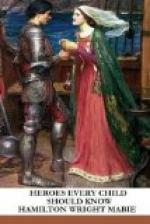At the very start courage and strength were necessary if life was to be preserved and men were to live together in safety and with comfort. When a strong man appeared he helped his fellows to make themselves more at ease in the world. Sometimes he did this by simply making himself more comfortable and thus showing others how to do it; sometimes he did it by working for his fellows. No matter how selfish a man may be, if he does any real work in the world he works not only for himself but for others. In this way a selfish man like Napoleon does the work of a hero without meaning to do it: for the world is so made that no capable man or woman can be entirely selfish, no matter how hard they try to get and keep everything for themselves.
It was not long before men saw that strong men could not work for themselves without working for others, and there came in very early the idea of service as part of the idea of heroism, and the demi-gods, who were among the earliest heroes, were servants as well as masters. Hercules, the most powerful of the heroes to Greek and Roman boys was set to do the most difficult things not for himself but for others. He destroyed lions, hydras, wild boars, birds with brazen beaks and wings, mad bulls, many-headed monsters, horses which fed on human flesh, dragons, he mastered the three-headed dog Cerberus, he tore asunder the rocks at the Strait of Gibraltar which bear his name to open a channel between the Mediterranean and the Atlantic. He fought the Centaur and brought back Alcestis, the wife of Admetus, from the pale regions of death where she had gone to save her husband’s life. In all these labors, which were so great that works of extraordinary magnitude have since been called Herculean, the brave, patient, suffering hero, was helping other people rather than helping himself.
And this was true of Thor, the strong god of the Norsemen whose hammer was the most terrible weapon in the world, the roll and crash of thunder being the sound of it and the blinding lightning the flash of it. The gods were the friends of men, giving the light and warmth and fertility of the summer that the fields might bear food for them and the long, bright days might bring them peace and happiness. And the giants were the enemies of men, tirelessly trying to make the fields desolate and stop the singing of birds and shroud the sky in darkness by driving away summer with the icy breath of winter. In this perpetual conflict Thor was the hero of strength and courage, beating back the giants, defeating their schemes and fighting the battle for gods and men with tireless zeal; counting no peril or hardship too great if there was heroic work to be done.
Courage and achievement are the two signs of the hero; he may possess or lack many other qualities, but he must be daring and he must do things and not dream or talk about them.




